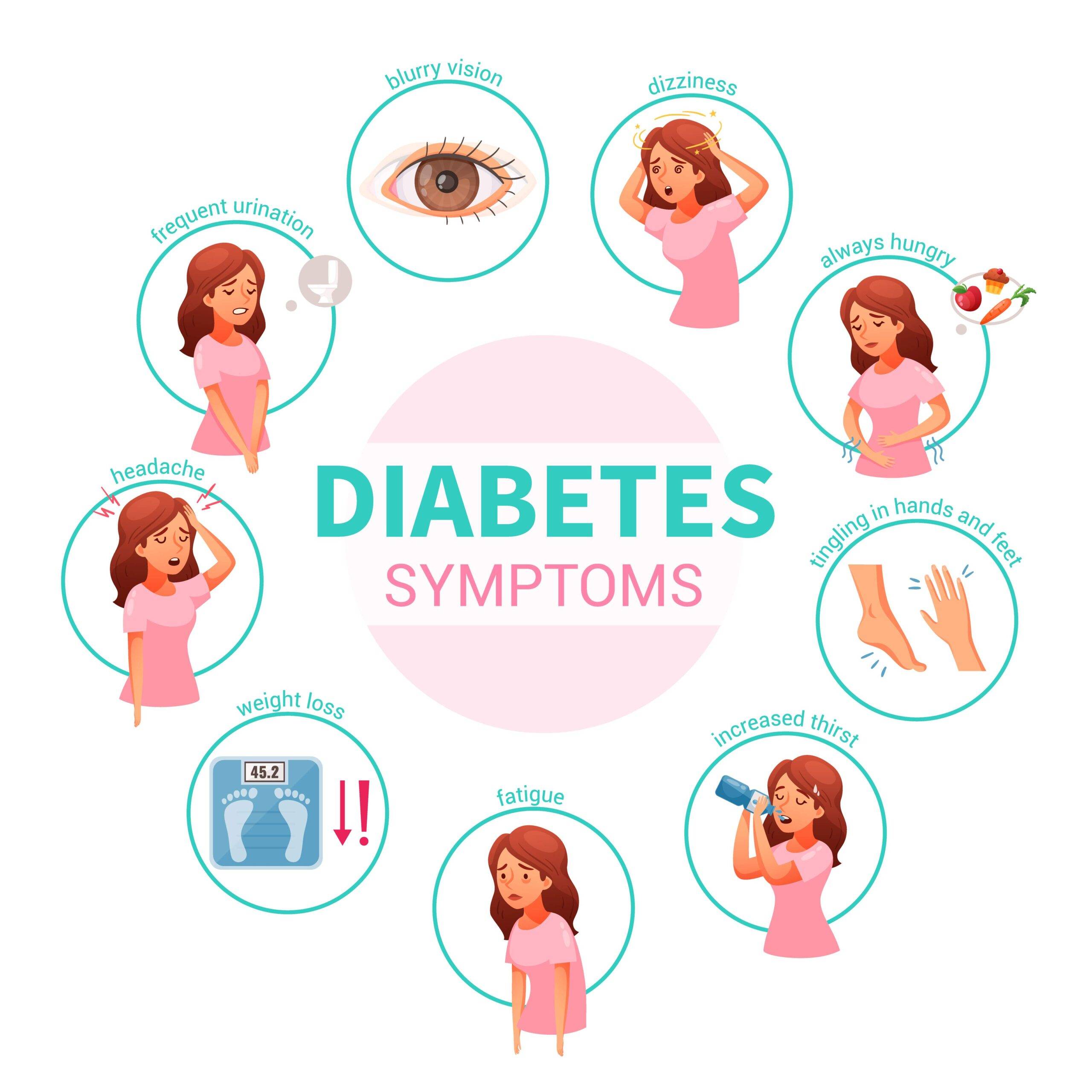People say “Trouble does not send a warning,” but when it comes to the body system, the body surely sends warnings, including warnings on the symptoms of diabetes.
According to the World Health Organization (WHO), 463 million people are living with diabetes worldwide. Of these, 374 million have type 2 diabetes and 89 million have type 1 diabetes while the number of people with undiagnosed diabetes is estimated to be 31.3 million. This means that there are more people with diabetes than those who are aware of their condition.
Each year, an estimated 1.6 million people are diagnosed with diabetes. This number is expected to increase to 700 million by 2045. The implication of this is, that we need a stronger awareness of the symptoms of diabetes and how we can adopt healthy lifestyles to counter the increase in the number of diabetic people.
Diabetes has plenty of early signs though some symptoms are subtle. Here are 10 symptoms of diabetes you should know:
Summary
- Frequent Urination
- Excessive Thirst
- Unexplained weight loss
- Weakness/Fatigue
- Numbness or tingling in the hands and feet
- Blurry vision
- Itchy skin
- Slow-healing wounds and increased skin infections
- Headaches
- Urinary tract infections and yeast infections
10 Symptoms of Diabetes You Should Know
1. Frequent urination
One of the symptoms of Diabetes is frequent urination. Most people urinate four to seven times a day. If you are making more trips to the bathroom, especially waking multiple times at night to go, it may be a sign that your kidneys are working overtime to flush out excess sugar in your blood.
Remember that drinking a lot of water, especially in the evening, may be why you’re urinating so often. If you are urinating more than one to two times overnight, try not drinking after 7 p.m. and not having caffeinated beverages after 5 p.m.
If you are still getting up multiple times to go to the bathroom at night, that may be a sign of diabetes.
Red Flag: Frequent trips to the bathroom even when you limit water intake and caffeine in the evening.
2. Excessive thirst
If you’re drinking more than 4 liters (about a gallon) per day and water isn’t quenching your thirst, this could be due to high blood sugar. This is because the body is not able to use the sugar in the blood for energy.
Red Flag: You feel thirsty after drinking water.
3. Unexplained weight loss
People with diabetes may experience unexplained weight loss, even if they are eating the same amount of food as usual. This is because the body is not able to absorb nutrients from food properly.
When your blood sugar levels are high, your body tries to get rid of the excess sugar by breaking down muscle and fat stores. This can lead to rapid weight loss, even if you are eating the same amount of food.
Red Flag: You keep losing weight even after eating a healthy lifestyle.
4. Weakness/fatigue
When sugar cannot get into your cells to energize them, your kidneys have to work overtime to remove the extra sugar. This can leave you feeling weak and fatigued.
Red Flag: You find yourself too weak to do everyday activities you were able to do with ease before or you feel exhausted after eating a meal.
5. Numbness or tingling in the hands and feet
Extra sugar in the blood can damage nerve endings, especially those nerves located farthest from the spinal cord such as those in your hands and your feet.
Red Flag: If you feel a tingling or numbness that feels like burning in your feet when you wake up.

6. Blurry vision
Sugar lingering in the blood can cause swelling in the lens in the eye making it difficult to focus your eyes. When your sugar is high, your vision blurs, but when your sugar drops down again, it clears.
Red Flag: If road signs, menus, books, or computer screens oscillate in your view at different times during the day.
7. Itchy skin
Poor circulation paired with the loss of fluids (from frequent urination) can cause the skin to dry out. Dry skin leads to itchy skin.
Red Flag: If you still notice yourself itching more than usual and have noticeably dry skin even after increasing your water intake.
8. Slow healing wounds and increased skin infections
Lingering sugar in the blood wreaks havoc on veins and arteries disrupting circulation. Without proper blood flow, it takes longer for cuts and bruises to heal, and you are more prone to skin infections.
Red Flag: Paper cuts, bumps, and bruises take more than a few days to go away, cuts scab over repeatedly, or wounds that last weeks to months.
9. Headaches
Headache is not a specific sign of diabetes, but it can be a symptom of diabetic ketoacidosis (DKA), a serious complication of diabetes.
DKA occurs when the body produces excess blood acids (ketones). This condition occurs when there isn’t enough insulin in the body. It can be triggered by infection or other illness.
Ketones can cause some symptoms, including headache, nausea, vomiting, confusion, and rapid breathing.
Red Flag: Regular headaches.
10. Urinary tract infections and yeast infections
High sugar levels within the urine are a breeding ground for bacteria and yeast near the genitalia. Urinary tract infections (UTIs) come with a burning sensation during urination and cloudy, dark, or off-smelling urine. Yeast infections come with itching, burning and discharge. People with diabetes are twice as likely to suffer from these types of infections.
Red Flag: Regularly occurring UTIs or yeast infections.
How Deadly is Diabetes?
Diabetes is a serious disease that can lead to several complications, including heart disease, stroke, blindness, kidney failure, and amputations. It is important to get screened for diabetes if you are at risk.
How to Reverse Diabetes
If you’re having some of these subtle signs, you can integrate a treatment plan that combines vegetables effective for reversing diabetes.
This involves trying a low-carb diet of protein and green leafy vegetables. Avoid sugary drinks and drink at least 2 liters of water for a few days to see if these symptoms get better.
If you have any symptoms that are frightening such as sudden numbness, weakness, or chest pains, start reversing the symptoms immediately.
These symptoms don’t necessarily mean you have diabetes, but it’s a wake-up call that maybe you’re headed that way.


Leave a Reply